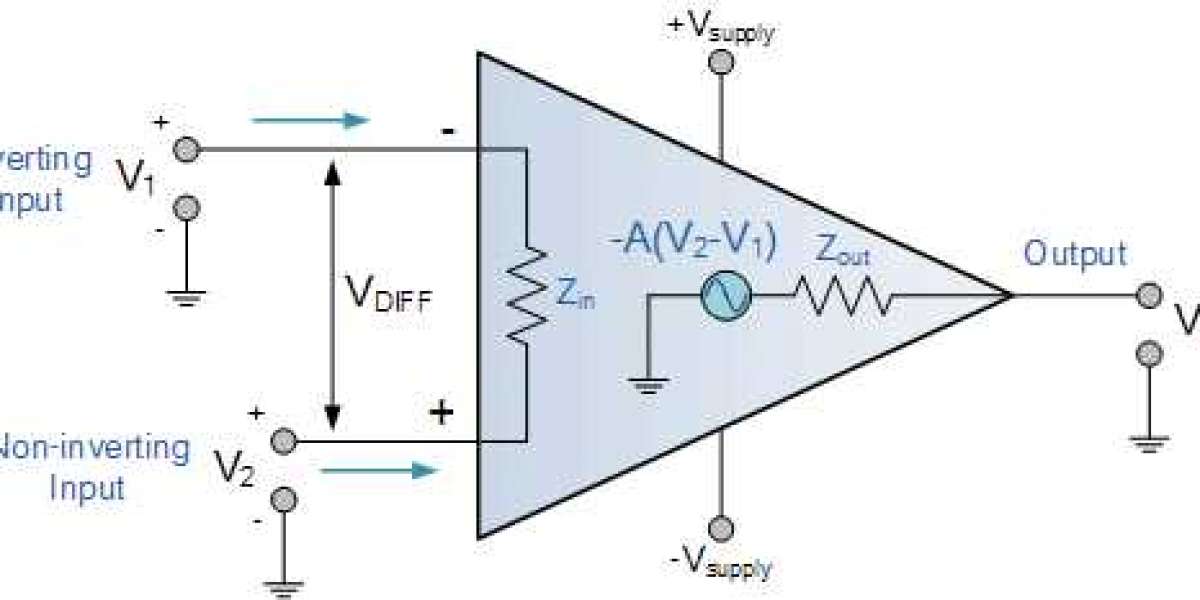Market Research Future Insights
According to MRFR analysis, The operational amplifier market share is expected to undergo a good market expansion at an average global CAGR during the ongoing forecast period for the global market of 2020-2027.
Operational amplifiers, which make up the operational amplifier (OP-AMP) industry, are regarded as the fundamental components of analog electronic circuits because of their high input impedance and high gain. An operational amplifier is a linear device that typically performs signal conditioning, filtering, or other processing tasks. It has all the qualities needed for DC amplification. It is utilized to carry out mathematical operations including addition, subtraction, integration, and differentiation, and is beneficial for application performance. Another definition of an ideal operational amplifier is a three-terminal device with two high-impedance inputs, one of which is an inverting input indicated with a negative sign and the other of which is a non-inverting input marked with a positive sign.
The pandemic's abrupt and unexpected emergence has caused significant obstacles and problems for the market potential for operational amplifiers that were being pursued throughout the current projection period, which will expire in 2028. The market must urgently develop alternatives in response to the new coronavirus pandemic's adverse effects, and must also record a sizable number of sales of such alternatives during the lockdown and functional limits imposed by the international market governments.
Free Sample Copy - Get a free copy of the sample report for a glimpse into our research expertise.
Market Segmentation
The global Operational Amplifier market has been segmented by Type and Application.
Based on Type, the market has been segmented into General Purpose, High-Precision, Low Noise, Low-Power, and Low Voltage Amplifier.
Based on Application, the market has been segmented into Automatic Control Systems, Medical, Test Measurement, and Vehicle Electronics.
Key Players
Some of the key market players are Texas Instruments, Maxim Integrated, STMicroelectronics, Cirrus Logic, ON Semiconductor, KEC (Korea Electronics), API Technologies Corp, NXP Semiconductors, Analog Devices, Fairchild Semiconductor.
Introduction:
The operational amplifier (op-amp) market has been witnessing significant growth in recent years, driven by the increasing demand for efficient circuit designs across various industries. Operational amplifiers play a crucial role in analog circuits, enabling signal conditioning, amplification, and filtering operations. A recent market research report by Market Research Future highlights the current trends and future prospects of the operational amplifier market. In this blog post, we will delve into the key insights from the report and explore the factors driving the growth of this market.
Growing Demand for Precise Analog Signal Processing:
The rising need for precise analog signal processing in diverse applications such as automotive, industrial, consumer electronics, and telecommunications has fueled the demand for operational amplifiers. These devices enable accurate amplification and filtering of analog signals, ensuring high-quality performance in various electronic systems.
In the automotive sector, operational amplifiers find applications in engine control units, electronic stability control systems, and infotainment systems, among others. Their usage facilitates enhanced sensor signal conditioning and reliable analog-to-digital conversion.
Moreover, the growing adoption of smart devices and the Internet of Things (IoT) has increased the demand for operational amplifiers in consumer electronics. These amplifiers are used in audio systems, wearable devices, and home automation systems, delivering optimal audio quality and efficient sensor signal processing.
Rapid Technological Advancements:
Technological advancements have played a significant role in the development of advanced operational amplifiers. Manufacturers are constantly investing in research and development to introduce op-amps with improved performance characteristics such as low noise, high bandwidth, low power consumption, and high slew rate.
Additionally, the integration of operational amplifiers with complementary metal-oxide-semiconductor (CMOS) technology has led to the development of low-power and high-precision op-amps, which are widely used in battery-powered portable devices and low-voltage applications.
Furthermore, the emergence of the Internet of Things (IoT) and Industry 4.0 has necessitated the development of operational amplifiers with enhanced performance in terms of power efficiency and noise immunity. These advancements have fueled the growth of the operational amplifier market, as industries increasingly adopt sophisticated analog signal processing solutions.
Expanding Industrial Automation:
The rapid expansion of industrial automation across sectors such as manufacturing, energy, and healthcare has created substantial opportunities for the operational amplifier market. Operational amplifiers are integral components in various industrial control systems, facilitating accurate data acquisition, signal conditioning, and control.
In the healthcare industry, operational amplifiers are employed in medical devices such as electrocardiography (ECG) machines, patient monitoring systems, and imaging equipment. These amplifiers enable reliable signal amplification and filtering, ensuring accurate diagnosis and treatment.
Furthermore, the increasing deployment of robotics and machine vision systems in manufacturing processes has augmented the demand for operational amplifiers. These amplifiers are utilized in robotic control systems, motor control applications, and image processing algorithms, enhancing operational efficiency and precision.
Conclusion:
The operational amplifier market is witnessing robust growth due to the rising demand for precise analog signal processing, technological advancements, and expanding industrial automation. As the need for high-performance analog circuits continues to grow across industries, operational amplifiers are set to play a pivotal role in enabling seamless circuit design and efficient signal processing.








